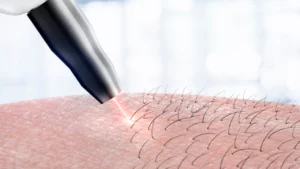In the bustling world of wellness trends and beauty standards, the recent portrayal of glutathione’s adverse effects in the popular web series “MADE IN HEAVEN” has sparked intrigue and concern. It’s not uncommon for a single web series to ignite curiosity and questions. The portrayal of it’s effects on a bride-to-be in “MADE IN HEAVEN” has certainly made waves, raising doubts about its safety and efficacy. As we delve into the depths of this “master antioxidant,” let’s separate fact from fiction and explore the comprehensive landscape of glutathione.
What is Glutathione?

Glutathione, often called the body’s “master antioxidant,” is a powerhouse compound naturally produced within our cells. Its formation relies on three key amino acids: cysteine, glutamine, and glycine. It plays a pivotal role in maintaining overall health and promoting wellbeing in every cell.
Functions and Benefits of Glutathione:
- Antioxidant Defense: It is a powerful antioxidant that protects the cells from free radical damage and oxidative stress. It helps neutralize harmful molecules contributing to aging, chronic diseases, and cellular damage.
- Detoxification: One of it’s primary roles is detoxification. It binds to toxins, heavy metals, and harmful substances, facilitating their elimination from the body. This detoxifying action helps support the liver’s function and overall detox processes.
- Immune System Support: This is essential for a robust immune system. It enhances the activity of immune cells, aids in producing antibodies, and helps regulate the immune response.
- Skin Health and Lightening: It has gained popularity for its potential to lighten skin by inhibiting melanin production. Some individuals use this antioxidant as supplements or skin creams to achieve a more even skin tone.
- Neurological Health: It plays a role in maintaining neurological health by protecting nerve cells from oxidative damage and supporting neurotransmitter function.
Sources of Glutathione:
While the body produces glutathione naturally, certain foods and supplements can help enhance its levels:
- Sulfur-rich foods: Garlic, onions, cruciferous vegetables (broccoli, cauliflower), and eggs contain sulfur, which is essential for this antioxidant synthesis.
- Whey protein: Whey protein contains cysteine and other amino acids that support production of this antioxidant.
- Glutathione supplements: Oral and intravenous supplements are available, but their effectiveness and safety can vary.
Potential Uses of Glutathione:
Skin Lightening: Some individuals use it as supplements or topical creams to lighten their skin. However, it’s often advised to consult a healthcare professional before using it for skin lightening.
Detoxification Support: This antioxidant supports the body’s natural detoxification processes and may be used as part of detox protocols under medical supervision.
Immune System Boost: Its adequate levels are essential for a healthy immune system. Some people take supplements to support immune function.
Anti-Aging and Wellness: It’s antioxidant properties make it a preferred option for individuals seeking anti-aging advantages and overall wellness.

Potential Uses of Glutathione:
- Skin Lightening: Some individuals use supplements or topical creams to lighten their skin. However, it’s often advised to consult a healthcare professional before using glutathione for skin lightening.
- Detoxification Support: It supports the body’s natural detoxification processes and may be used as part of detox protocols under medical supervision.
- Immune System Boost: Adequate levels are essential for a healthy immune system. Some people take it as supplements to support immune function.
- Anti-Aging and Wellness: Its antioxidant properties make it a preferred option for individuals seeking anti-aging advantages and overall wellness.
Conclusion:
It is a vital compound with multifaceted benefits for our health and wellness. From its antioxidant and detoxification properties to its potential uses in skin care and immune support, it plays a central role in maintaining optimal health. Whether through dietary sources, supplements, or medical interventions, understanding it’s functions empowers us to make informed choices for our overall wellness journey. As with any supplementation, it’s advisable to consult a healthcare professional before incorporating it into your routine to ensure it complies with your specific health requirements.
Frequently Asked Questions
1. What Happens to Your Body When You Start Taking Glutathione?
When you start taking glutathione, your body may experience various effects based on its functions. It is a powerful antioxidant that helps neutralize free radicals and oxidative stress. This can contribute to improved cellular health and reduced oxidative damage. Additionally, it supports detoxification processes, removing toxins and harmful substances from the body.
2. What Happens If I Take Glutathione Everyday?
Consuming it as a supplement on daily basis may support your body’s antioxidant defenses and detoxification processes. However, it’s important to note that the effects of long-term supplementation are still being studied. Taking excessive amounts of supplements may disrupt the body’s natural production and balance of this antioxidant. Follow recommended dosage guidelines and consult a healthcare professional before daily supplementation.
3. What to Consider Before Taking Glutathione?
Before taking glutathione, consider the following factors:
- Consult a healthcare professional: Discuss your intention to take supplements with a healthcare provider to determine if it suits your health profile.
- Dosage: Follow recommended dosage instructions to avoid potential adverse effects.
- Pre-existing conditions: Inform your healthcare provider about any existing medical conditions or medications you’re taking, as supplements may interact with certain drugs.
4. What is Important to Avoid When Taking Glutathione?
When taking supplements, consider the following precautions:
- Self-medication: Avoid self-prescribing glutathione supplements without consulting a healthcare professional, as excessive intake may have unintended effects.
- High doses: Taking excessively high doses of supplements without medical guidance can disrupt the body’s natural production and balance.
- Lack of professional advice: Always seek advice from a healthcare provider before incorporating it into your routine, especially if you have underlying health conditions or are taking medications.







